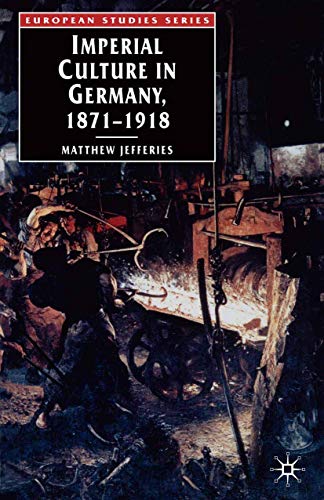Articoli correlati a Imperial Culture in Germany, 1871-1918

Sinossi
It has often ben suggested that artists and writers in Germany's imperial era shunned social engagement, preferring instead apolitical introspection. However, as Matthew Jefferies reveals, whether one looks at the painters, poets and architects who helped to create an official imperial identity after 1871; the cultural critics and reformers of the later nineteenth century; or the new generation of cultural producers that emerged in the years around 1900, the social, political and cultural were never far apart.
In this attractively illustrated book, Jefferies provides a lively introduction to the principal movements in German high culture between 1871 and 1918, in the context of imperial society and politics. He not only demonstrates that Germany's 'Imperial culture' was every bit as fascinating as the much better known 'Weimar culture' of the 1920s, but argues that much of what came later has origins in the imperial period.
Filling a significant gap in the current historiography, this study will appeal to all those with an interest in the rich and diverse culture of Imperial Germany.
Le informazioni nella sezione "Riassunto" possono far riferimento a edizioni diverse di questo titolo.
Informazioni sull?autore
MATTHEW JEFFERIES is Lecturer in German History at the University of Manchester and Visiting Lecturer at the Northern Institute of Technology, Hamburg-Harburg.
Dalla quarta di copertina
It has often ben suggested that artists and writers in Germany's imperial era shunned social engagement, preferring instead apolitical introspection. However, as Matthew Jefferies reveals, whether one looks at the painters, poets and architects who helped to create an official imperial identity after 1871; the cultural critics and reformers of the later nineteenth century; or the new generation of cultural producers that emerged in the years around 1900, the social, political and cultural were never far apart.
In this attractively illustrated book, Jefferies provides a lively introduction to the principal movements in German high culture between 1871 and 1918, in the context of imperial society and politics. He not only demonstrates that Germany's 'Imperial culture' was every bit as fascinating as the much better known 'Weimar culture' of the 1920s, but argues that much of what came later has origins in the imperial period.
Filling a significant gap in the current historiography, this study will appeal to all those with an interest in the rich and diverse culture of Imperial Germany.
Le informazioni nella sezione "Su questo libro" possono far riferimento a edizioni diverse di questo titolo.
- EditoreRed Globe Pr
- Data di pubblicazione2003
- ISBN 10 1403904200
- ISBN 13 9781403904201
- RilegaturaCopertina rigida
- LinguaInglese
- Numero di pagine338
- Contatto del produttorenon disponibile
EUR 8,31 per la spedizione da Regno Unito a Italia
Destinazione, tempi e costiCompra nuovo
Visualizza questo articoloEUR 7,88 per la spedizione da U.S.A. a Italia
Destinazione, tempi e costiRisultati della ricerca per Imperial Culture in Germany, 1871-1918
Imperial Culture in Germany, 1871 - 1918 (European Studies)
Da: Books Puddle, New York, NY, U.S.A.
Condizione: New. Codice articolo 26134591238
Quantità: 1 disponibili
Imperial Culture in Germany, 1871 - 1918 (European Studies)
Da: Biblios, Frankfurt am main, HESSE, Germania
Condizione: New. Codice articolo 18134591244
Quantità: 1 disponibili
Imperial Culture in Germany, 1871 - 1918 (European Studies)
Da: Majestic Books, Hounslow, Regno Unito
Condizione: New. Codice articolo 141692121
Quantità: 1 disponibili
Imperial Culture in Germany, 1871-1918 (European Studies Series)
Da: Bestsellersuk, Hereford, Regno Unito
Hardcover. Condizione: Very Good. warped, bumps and scratches to cover No.1 BESTSELLERS - great prices, friendly customer service â" all orders are dispatched next working day. Codice articolo mon0000833477
Quantità: 1 disponibili
Imperial Culture in Germany, 1871-1918 (European Studies)
Da: Nauka Japan LLC, Tokyo, Giappone
Condizione: New. Without jacket. [mac 10c 2545]. Codice articolo SKU001081
Quantità: 1 disponibili
Imperial Culture in Germany, 1871-1918 (European Studies)
Da: Mispah books, Redhill, SURRE, Regno Unito
Hardcover. Condizione: Like New. Like New. book. Codice articolo ERICA79014039042006
Quantità: 1 disponibili
Imperial Culture in Germany, 1871-1918 (European Studies)
Da: Midtown Scholar Bookstore, Harrisburg, PA, U.S.A.
Hardcover. Condizione: Good. Good - Bumped and creased book with tears to the extremities, but not affecting the text block, may have remainder mark or previous owner's name - GOOD Standard-sized. Codice articolo M1403904200Z3
Quantità: 1 disponibili

